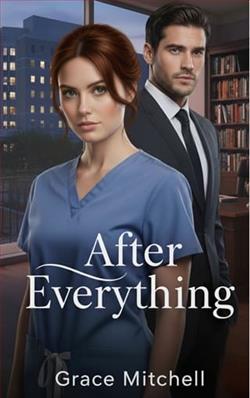Page 10 of Once Upon a Thyme
‘Oh.’ My ears heated up with embarrassment and I covered myself. ‘Okay, well, we’d better get on if we’re going to be in a meeting later. If you could keep an eye on the shop and help Ollie with the mint arrangements, I’m going to check on the damage the animals have done to the plants and work out whether we need to replace any.’
‘Fine.’ But he’d taken his hands out of his pockets now and dropped his shoulders. I was good at body language; when you lived with Mother for any length of time you learned to read subliminal signals because overt signals were hard to come by, and I knew that the olive branch of including him in the meeting with Simon had worked.
As I wandered over to the most badly beaten section of the garden I pondered on why I cared so much? Why would it matter if Zeb didn’t like me and was in a state of permanent anger towards me? He was only here for a month, andthatwas on my sufferance. I could kick him out at any time and any financial restitution would be between him and my mother and none of my business. I didn’t wantherinterfering and I didn’t wanthimpoking about in my affairs.
So why didn’t I just say so?
The rosemary, being fairly resistant to damage, had fared better than the parsley. That poor plant was looking trampled and there were distinct nibble marks, plus the smell of crushed salad garnish wafted over the entire area. I knelt down and began trimming off the worst of the broken stalks and battered leaves. Luckily there was plenty to go round, so some judicious pruning soon made the bed look presentable, although the same couldn’t be said for the fennel. Some of that looked as though it had been sat on, and there was already a big bald patch where yesterday’s damage had been removed. I sighed.
‘I hope we’ve got enough left to plant out,’ I muttered. That was the problem with the tall herbs, they showed any slight impact so much more than the low-growing types. One good gale could level the most attractive plants, which was why this completely walled and sheltered spot was so ideal for my business. Granny had known what she was doing when she set it up, I mused, kicking gravel back onto the path from where it had been liberally redistributed onto the planting by pig and folk band activity. Drycott Herbs had been her baby. Well, my mother had been her baby, but Granny had always seemed rather fonder of the herb nursery than of raising children, which was probably why Mother was an only child; that and she’d turned out to be an experiment that Granny hadn’t wanted to risk repeating.
The sun, high now above us and only slightly filtered through the tracery of the birch trees that formed a small copse in the field over the wall, soothed me. It settled on my head like a warm hat and slid down my back into my tired limbs, soft as a kiss. I inhaled deeply, getting a good waft from the variety of different leaves and flowers that variously needled or coiled around my legs as I stood in the middle of the bedding. This was where I belonged.Myherb farm,mybusiness, and Mother and her machinations could just fuck off.
It was just a shame that Granny wasn’t still here to affirm my decision. But then, if she had still been here, Drycott would still belong to her, I’d probably be living now with my mother in her suffocating little house in the village and I’d be… what would I be? What would I ever have become if Granny hadn’t taken me under her wing and taught me about herbs. Growing them, planting them. The right times to harvest. How to make arrangements that looked better than conventional flower bouquets, how to use them in cooking.
Without Granny, would I just have been a carer for my mother?
Ollie gave me a beaming smile, heading towards the mint beds wielding his best secateurs, and I bit my lip.No. I had to stop thinking that way. Some people just needed a bit more looking after than others. It wasn’t Ollie’s fault that he couldn’t cope with strangers and that he was detail-orientated. And it wasn’t my Mother’s fault that she was so ill and needed help. It wasn’t her fault that her life had gone so wrong after I was born, that it had caused her such trauma she now found it hard to function.
Nobody’s fault. But it did mean that the end result was pieces that needed to be picked up, and I’d learned how to do that without asking why from an early age.
I stretched myself under the sun’s warmth again and let myself relax. A bee, heading for the lavender bushes, bounced off my forehead, adjusted its flight path and lurched downwards to join its hive mates poking around the pale flowers at knee level. I bent to pick a bee-free stem and let the scent soothe me. Good old lavender. Reliable, perpetual, attractive – if occasionally tending to scruffiness, it didn’t need much looking after and would do its thing year after year with the minimum of care.
I pulled the flower head between my fingers and wondered whether I’d been thinking of lavender or myself when that description had come to mind. There were an extraordinary number of similarities, although I was marginally less attractive to bees and probably – I looked down at my worn jeans and untucked shirt – less fragrant. The pale purple petals fluttered from my hands, torn and spoiled, to decorate the gravel as though fairy confetti had been liberally thrown at a fae wedding.
I had to stop this. Introspection was all very well, but it wouldn’t get the fennel bed patched or the mallows tied in to their decorative supports. Self-analysis was self-indulgent. I was me, Natalie, Tallie to my friends, Fisher. Owner of Drycott Herbs and… well, all right, not very much else, but I had my own business and that was enough. The total lack of social life and any appreciable kind of romance was a side effect of having to work so hard, that was all. I tried really hard not to add to myself that having a mother who needed me on call 24/7 didn’t help either of these things much, because hadn’t I already agreed with myself that none of this could be helped? She hadn’t chosen to be physically frail and mentally non-resilient, had she?
What shehaddone, though, was land me with Zeb McAuley-Whatsit, who was currently drifting around outside the shop, rearranging buckets and ignoring the fact that a car had pulled in and there were people who actively needed to be sold things wandering around the stable yard.
I watched him tweak a few buckets into place and then straighten up to greet the potential customers. He looked a lot more personable at a distance; he had that tall, long-limbed thing going on that made every gesture into something big, and his hair wasn’t so objectionably floppy from back here. He looked like just another worker, the irritating questions and intrusive behaviour being too far off to bother me. I tried to ignore the tiny tug that I felt somewhere deep inside when I thought of his offer of help; the way he looked as though life had hit him very hard around the head and then expected him to get up and carry on. There was justsomethingabout Zeb, and I wasn’t sure if that tug was fellow feeling or a desire to bury him under the mint bed.
While I was looking at him, Zeb looked up and across the acres and met my eye. It was too late to switch focus and pretend I’d really been checking the line of the fencing or assessing the distant marigolds; he’d clearly caught me staring at him because he raised his eyebrows. I didn’t know whether he was questioning my stare, expressing surprise that I was even looking his way or raising a problem with a customer, but to cover my confusion at being caught out, I set off towards him. I had to work on a reason for going over, so I focused on the customers, a young couple, who might have questions. After all, it wasn’t unreasonable for me to want to be there, selling things. Ioughtto be there and actively selling, in fact. Just so that he was in absolutely no doubt that this wasmyplace.
I didn’t let myself think about my suspicions regarding letting the animals out. There was no time now to wonder whether Zeb, whatever his reasons, was trying to sabotage my business.
5
It was mid-afternoon before Simon arrived, sweeping into the car park with a flourish of scattered gravel in a sporty little Audi. My heart did a tiny swoop at his arrival and then a dive when I realised that he hadn’t brought any members of the band with him. That he hadn’t broughtMikawith him, to be precise. It felt a bit like visiting the Louvre only for theMona Lisato be away for cleaning that day.
I greeted him at the gate, where I had fortuitously been weeding the car park and not at allwaiting for his arrival.
‘Come on through to the cottage.’ I led Simon through the gardens, slowly, to give him a chance to appreciate the lazy wave of stems in the faint breeze and the way the tree shadows threw a jigsaw of darkness across the walls. It was all looking very photogenic and lovely, which was fabulous. We needed the money that filming would bring in, and seeing the place under a grey cushion of cloud with everything hanging soggily heavy and accessorised with disgruntled damp pig smells might have put him off.
I tried to suppress my disappointment at the lack of Mika. There was absolutely no reason for the band to have come with Simon, but… damn it, I had little enough to look forward to. Did the universe really have to grudge me this tiny spark? Evidently it did.
I motioned Simon into the cottage kitchen, and he bent his head to come in under the low lintel. I had carefully swept the floor, wiped all the sides and put pots of herbs on almost all the flat surfaces to conjure the atmosphere of ‘herb garden’. As I followed him in, however, I realised that it looked overdone. As though I were shouting ‘this is agarden’in his ear; too desperate. And the light shining through the pots on the windowsill gave the room an underwater feel, too reedy and dim, which I hadn’t noticed when I’d carefully and artfully distributed them earlier this morning. Once I was in the kitchen I swooped up some of the pots into a bundle at one end of the worktop.
‘I’ve been potting up,’ I said, to explain the Kew Gardens Glasshouse ambience.
Simon sat at the table and looked around. He seemed happy enough.
Zeb was now looming in the doorway. He had stalked down the long path, following us at a distance, but he hesitated at the door. ‘Are you going to talk about – you know? The band filming?’ he asked, standing on the threshold with one leg raised to step inside.
I widened my eyes. ‘Well I don’t think he’s here to discuss buying industrial quantities of dill, is he?’ I hissed back, then relented. ‘Come on. You might as well earn whatever my mother is paying you,’ I said, straining the words through a smile directed at Simon, who was looking around at the masses of greenery, and me, with an amiable expression.
‘I shall do my best.’ The foot came over the doorstep and Zeb greeted Simon. ‘Hello.’
The men shook hands. Nobody had shaken hands with me, I thought, snarling inwardly. But then, I hadn’t offered to shake hands with Simon. Should I have offered? When had I last shaken hands with anyone? I rearranged more pots to give myself something to do. There was now a veritable forest jammed up under the old dresser top, giving the kitchen – which always had a slightly olde worlde air from the beams and the flagstones and the ancient wooden furniture – a distinct tinge of the alchemist’s basement.















